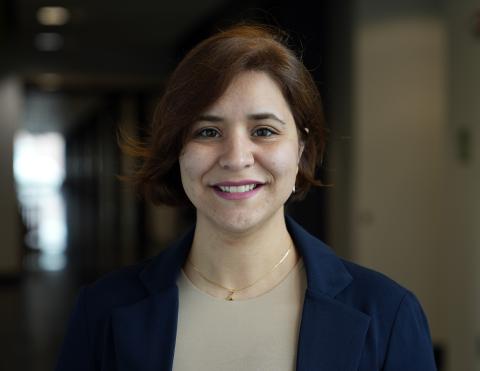
Elham Ajorlou is a Ph.D. student in the civil and environmental engineering department, specializing in geotechnical engineering. She received a Bachelor of Science from the University of Tehran in civil engineering, and her hometown is in Iran.
1. Why did you choose UNH for your graduate program?
First, the solid academic reputation, including high-quality programs with access to top-notch faculty, resources, and research opportunities, motivated me to choose UNH. Second, the wide range of multidisciplinary research at UNH has solidified my decision to choose this research-intensive institution. This offers a unique educational experience that combines diverse areas of study, fosters collaboration, and teaches a well-rounded skill set with a broader perspective. Furthermore, UNH provides scholarships to support graduate students in pursuing their education. Finally, located in the beautiful state of New Hampshire, UNH offers a mix of rural charm and access to urban areas.
2. What is your Research Focus?
I am doing interdisciplinary research funded by NSF, which is aimed at discovering the impact of decisions made by engineers in the design of flood infrastructure (particularly levees and breakwaters). We are investigating social science factors that influence design decisions to build a model to predict infrastructure performance. The primary goal of this research is to explore the relations between personal attitudes and risk perceptions of engineers. This project has different phases as follows: Interviewing experts from flood control infrastructure agencies, distributing surveys among flood control infrastructures engineers in the US, and generating a model/framework to represent relations and beneficial recommendations.
3. What are you hoping to accomplish with this research? How will it potentially impact society or day-to-day life?
We are hoping to gain deeper insights into the influential factors that shape design decisions within the realm of engineering practitioners. The takeaways represent interactions between risk perceptions and climate considerations in the design process and engineer's personal attitudes. It advances interdisciplinary collaborations and reinforces infrastructure resilience. Flood-induced infrastructure damage disturbs day-to-day lives of communities and carries a significant financial burden. Thus, robust flood-control infrastructures can contribute to the resilience of local economies. Minimizing the risk of flooding allows communities to maintain their daily routines, access essential amenities, and sustain a sense of normalcy, which is crucial for community well-being.
4. What do you enjoy most about your experience at UNH?
On top of enjoying my current research, I am privileged to be a CARPE (Convergent Arctic Research Perspectives and Education) fellow, a distinctive program at UNH that has provided me with invaluable experiences. Through this program, I have acquired knowledge about cross-disciplinary studies, leveraging team science principles within research teams and fostering collaboration with Indigenous communities in Arctic research. Further, UNH's vibrant inclusion-oriented events and support for international students celebrating traditional events and standing for human rights movements were remarkable. Additionally, I am delighted to study at one of the safest campuses, allowing me to focus on academic pursuits.
5. What do you hope to do after your time at UNH?
First, I would prioritize self-care and maintain a healthy work-life balance. Then, to enhance my academic reputation and share my findings, I would continue publishing papers/presenting at conferences. It also helps me maintain and expand my professional network and seek potential collaborations. Furthermore, to contribute to my academic profile, I would like to apply for grants to provide financial support for my post-PhD journey. In addition, I hope to pursue an industry-based career aligned with my interests and goals to experience practical applications of expertise, see tangible results, and explore opportunities in research, consulting, data science, management, entrepreneurship, and more.
6. What is your advice for someone on how to best prepare for a graduate program?
I would say understanding the principle of team science is a fundamental aspect of graduate programs as it cultivates collaborative environments to conduct robust work through a cohesive team with diverse perspectives and without conflicts. Furthermore, it is super helpful to become familiar with curriculums, particular requirements, research opportunities, faculty expertise, and expectations of the program they want to join. Moreover, as extensive writing and communication skills are essential to successful graduate journeys, it is beneficial to practice academic writing before the program. Plus, know yourself, practice managing your time, be an ahead-of-schedule performer, and meet deadlines.